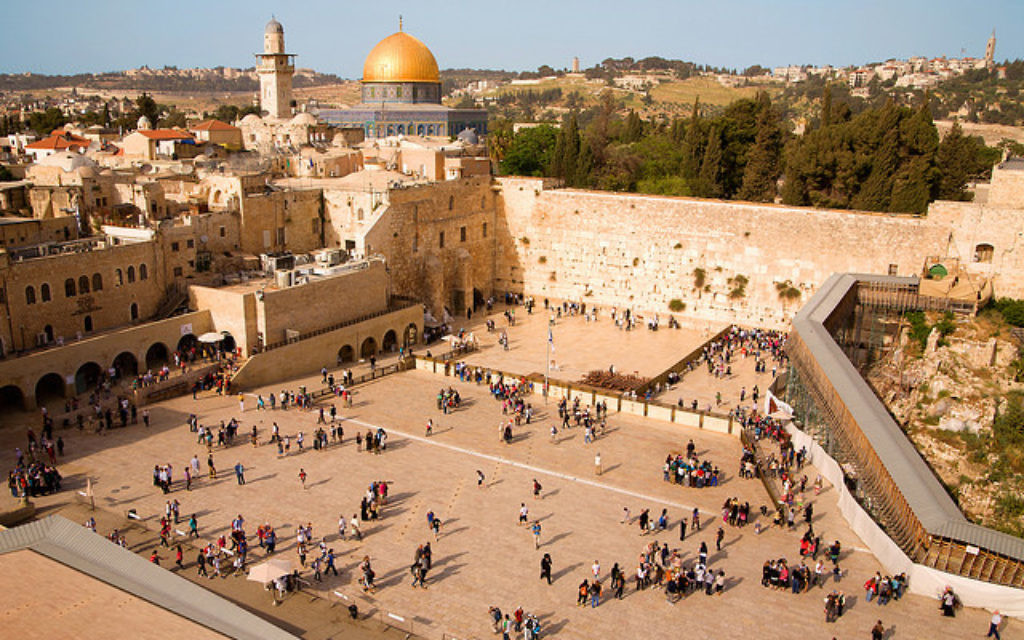Av: Grief and Love
This month takes us from the lows of destruction to the heights of joy.

Rosh Chodesh Av began Monday, July 24. Av is an intense month of polarized emotions.
The 9th of Av (Tisha B’Av) ends a three-week period of mourning that began on the 17th of Tammuz. Tisha B’Av commemorates the Day of Disasters, recalling the grief from the destruction of the First and Second Temples.
During the month of Adar, our joy increases, but during Av, it’s diminished.
Get The AJT Newsletter by email and never miss our top stories Free Sign Up
Yet, by contrast, the 15th of Av (Tu B’Av) celebrates the highest point of joy, the Holiday of Love. This day honors the sun’s masculine energy at its yearly peak as it converges with the moon’s monthly peak of feminine energy. This completeness of both energies during the full moon invites an opening for one to find his or her soulmate.
Our task is to integrate the polarizing emotions that are part of the human condition. When grief is present, it can be painful to experience love. When love is the focus, the fear of losing that love can surface. We need to find the courage of the lion, Leo’s zodiac symbol this month, to live with these emotions alongside each other.
We look to the Sefer Yetzirah (Book of Formation) to achieve balance.
During Av, the zodiac sign is Leo; the Hebrew letter, tet; the tribe, Shimon; the sense, hearing; and the controlling organ, the left kidney.
Useful traits of Leo include courage, leadership and zest for life.
The Hebrew letter tet resembles the womb, like a circle with an extension hiding within it. It houses the hidden good and lets us curl up inside Hashem’s protection. That doesn’t mean we can bypass hardship, but we know we’re not moving through it alone.
Shimon is the only tribe Moses did not bless at the end of the Torah because it was involved with committing the sins of Pe’or, including idolatry and engagement with foreign women who were prostitutes.
The sense is hearing, which in Hebrew means to understand. There’s a distinction between hearing and understanding. We can hear what people tell us to do regarding our grief and love, but there needs to be connection with our deepest internal understanding if we are to maneuver through these powerful emotions.
The controlling organ is the left kidney, from which bodily fluids arise. The important issue of balance in our emotions is also vital in our bodies during this month of intense heat. An equilibrium between metabolic heat and fluids keeps us from dehydration and depletion.
Time on the Hebrew calendar is a spiral. Each year we revisit the themes and lessons to chart our course to see whether we’ve stayed mindful of our learning. Have we remained on track and elevated ourselves?
Like time, the spiral of grief is not linear. Elisabeth Kübler-Ross’ five stages of grief follow the acronym DABDA: denial, anger, bargaining, depression and acceptance. We don’t neatly complete a stage and move to the next until we arrive at acceptance. We cycle in and out of our feelings.
Neither does love follow a linear path. People refer to “falling in love,” the “honeymoon phase” and “mature love.” Love’s path and expression continue to evolve and change or, sometimes, come to an end if the cycle is complete.
I had a discussion with a rabbi who used the saying “This too shall pass.” I found it comforting until he added that the saying applies to the good things as well. When we experience grief, we want it to pass quickly, yet when we feel the joy of love, we never want it to change or end.
In recognizing the fragility of life and passage of time, we would do well to make the most of each day, even the difficult ones, because they’re still days we’ve been granted.
With the awareness of ourselves as the single vessel or container, we can move back and forth, between the emotions of grief and love, instead of trying to stay fixed within one or the other.
Meditation focus: What has to shift so that you can acknowledge your grief and unblock your love?




comments